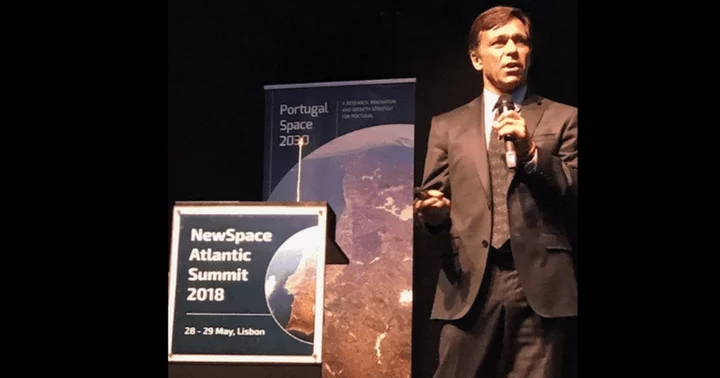BARCELONA, SPAIN: The co-founder of OceanGate Expeditions appears undeterred by the Titan submersible tragedy and is aiming to push the boundaries of extreme travel by establishing a floating colony on Venus. The project has an ambitious goal of accommodating 1,000 humans by 2050.
Guillermo Sohnlein, who co-founded OceanGate in 2009 with Stockton Rush but stepped away in 2013, is now the founder and chairman of Humans2Venus, as per his Linkedin. The company is described as a "private venture dedicated to establishing a permanent human presence in the Venusian atmosphere."
What is Humans2venus?
Humans2Venus is a private venture founded and led by Sohnlein, the co-founder of OceanGate Expeditions. The primary objective of the firm is to establish a permanent human presence in the atmosphere of Venus. The project aims to create a floating colony or space station-like structure on Venus that can potentially accommodate up to 1,000 humans by the year 2050.
The vision behind Humans2Venus is to explore the possibilities of human habitation in Venus' atmosphere, despite the planet's challenging conditions, such as sulfuric acid in the clouds and hurricane-force winds. Sohnlein envisions overcoming these obstacles to enable humans to live and thrive on Venus.
The project operates as a privately-funded initiative, aiming to make space exploration more accessible and cost-effective. While specific details about the technological aspects of the proposed floating colony are yet to be disclosed, the ambitious endeavor demonstrates a commitment to exploring and colonizing celestial bodies beyond Earth.
As of now, additional information about the project's progress, funding, and feasibility has not been widely publicized, and representatives for Humans2Venus have not responded to media inquiries seeking further details about the initiative.
Is Venus inhabitable?
Sohnlein expressed his conviction in the new endeavor and emphasized that humanity shouldn't miss this significant breakthrough opportunity. He also expressed his fear that if we stick to the status quo, we might lose out on exploring the new frontier. “Forget OceanGate. Forget Titan. Forget Stockton. Humanity could be on the verge of a big breakthrough and not take advantage of it because we, as a species, are gonna get shut down and pushed back into the status quo,” Sohnlein told Insider.
According to NASA's findings, there is a specific region approximately 30 miles from Venus' surface where humans could theoretically survive. Sohnlein envisions creating a floating colony that can withstand the harsh conditions of Venus' atmosphere, such as its sulfuric acid, but there are no details about how the colony would handle the hurricane-force winds, which can reach speeds of up to 224 miles per hour.
“It is aspirational, but I think it’s also very doable by 2050,” Sohnlein told Insider.
In a blog post on the Humans2Venus website, Sohnlein expressed his faith in the abilities of engineers and scientists. He explained that Venus was chosen as the target for colonization due to its gravity, which is similar to Earth's. Sohnlein also shared a personal connection to space exploration, recalling a childhood dream of being the commander of the first human community on Mars.
“I am not an engineer or a scientist, but I have ultimate faith in the abilities of both. Therefore, I always figured that they would be able to overcome the myriad challenges facing us in the extreme environment of space,” Sohnlein wrote in a blog post.
The tragedy with OceanGate's Titan submersible has not deterred Sohnlein from pursuing his dreams of space exploration. He previously described underwater exploration, using crewed submersibles, as the closest experience to space exploration without actually leaving Earth.
'Doing whatever I can to help humanity become a multi-planet species'
“When I was 11 years old, I had a recurring dream that I was the commander of the first human community on Mars,” Sohnlein wrote. “I have spent the more than four decades since then doing whatever I could to help humanity become a multi-planet species.”
Just like OceanGate, Humans2Venus operates as a privately-funded endeavor to reduce the costs of space exploration. Sohnlein believes that private groups can advocate and potentially achieve this vision faster than governmental agencies like NASA. "I could fully understand the political and economic realities that prevented NASA from adopting a ‘Moon, Venus, Mars and Beyond’ vision instead of its current ‘Moon, Mars and Beyond’ long-term plan," he wrote.
Sohnlein is also associated with the WayPaver Foundation, a research-guided grant that has supported both OceanGate and Humans2Venus' efforts. Additionally, he is involved with Blue Marble Exploration, a high-profile exhibition company that has undertaken space trips and plans to explore the "virtually unexplored" Dean's Blue Hole, the world's second-deepest marine cavern with a depth of 663 feet, in 2024.









